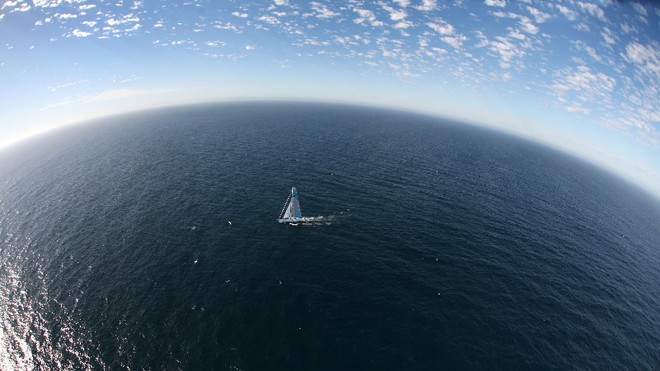What makes a solo sailor? - New study
by Sail-World Cruising/VELUX 5 OCEANS on 1 Oct 2010

Alone - study to ask why SW
What is it that makes a solo sailor? Among the thousands of sailors who set off from home for an afternoon, a day, a year or longer, why is it that some wish to do it alone? A contingent from the University of Portsmouth (UK) is about to try to find out by a study of the eight participants in the next VELUX 5 OCEANS 'Ultimate Solo Challenge' round world solo race.
To the outsider, as the VELUX people say on their website, 'life at sea alone is tough, lonely, frustrating and demanding. Being forced to live in a space no bigger than a garden shed for weeks at a time while getting no more than about three hours of broken sleep a day is no normal person's idea of fun.
'It takes a special someone to want to be a solo ocean racer and compete in a challenge such as the VELUX 5 OCEANS where each day they will be taken to the absolute limit and beyond. They must be willing to subject themselves, their family and their friends, to a rollercoaster of emotions from joy to despair, relief to anxiety, calm to worry, in pursuit of their one dream: to sail round the world alone.
'Are they motivated by glory or by fame; is it a need to satisfy a hunger for the challenge that has long burned inside of them; is it simply just curiosity? What is it that makes these special people willing to risk everything?'
While the study is of ocean racers, it will no doubt elucidate just why some people take on their challenges alone rather than with others - people such as Reid Stowe, who stayed 1152 days alone at sea, Jessica Watson, who spent eight months alone at the age of 16, Minoru Saito, famed Japanese sailor who has completed eight solo circumnavigations, Donna Lange, who says tragedy drove her to sail alone, or Jeanne Socrates, British grandmother who is just about to attempt her third solo circumnavigation.
This will be a pioneering study, as the team of psychology experts team up with the VELUX 5 OCEANS to provide answers to the questions that have surrounded long distance solo sailing for so many years. The team is led by sports psychology expert Dr Neil Weston from the Department of Sport and Exercise Science from the University of Portsmouth (UK), the researchers will seek to unravel the mysteries of solo sailing.
'For a lot of skippers one of the main motivating factors is to test themselves to the limits of their human capabilities in an environment that can often threaten their life,' Dr Weston said. 'Achieving a solo circumnavigation and coming through the enormous physical exhaustion and anxiety of the sport results in obvious euphoria and a long lasting satisfaction that so few people will ever be able to experience.'
The study will delve deeper than ever before into the characteristics required and will centre around 'mental toughness' - that inner drive that says 'I will not give in, I will do whatever is necessary to get the job done, I will survive'.
Up until now sports research has focused heavily on relatively safe land-based sports like football, rugby and cricket, with no research examining the concept of mental toughness in challenging activities in extreme environments such as solo sailing. As their website says, the VELUX 5 OCEANS research project marks a unique and important contribution to the scientific literature in the area.
'We want to find out what, psychologically, it is that distinguishes solo sailors from the average human being,' said Dr Weston. 'Why do these people want to participate in a sport that threatens their life and can result in significant physical and mental hardship? The project aims to identify the mental toughness attributes of single-handed round the world ocean sailors. We aim to identify how these attributes can be developed or trained over time with a view to identifying some preparation and training guidelines for skippers interested in participating in solo endurance ocean sailing. So a young solo sailor wanting to become the next Robin Knox-Johnston can actually see what attributes they might need and how they might be able to develop them.'
Long distance singlehanded ocean racing is notorious for its effects on the human body and mind. Physically, it is one of the most relentless challenges known to man; skippers must be in control of a ten-tonne 60ft yacht blasting along at break-neck speeds through the world's oceans. This is a 24-hour job and skippers often get little or no rest. Recent research by Dr Weston has shown that on average skippers accumulate between 30 minutes and five hours of sleep per day. One sail alone weighs more than the skipper and changes in sails can occur frequently. But mentally the strains on a skipper can be as much if not more troubling.
Dr Weston and his team will interview each of the VELUX 5 OCEANS skippers in Charleston, USA, immediately after Ocean Sprint 4 and again at the race finish in La Rochelle. The team hopes their research will shed new light on the fascinating, mystifying and inspiring characters that are solo ocean racers, and maybe through that, all solo sailors.
If you want to link to this article then please use this URL: www.sail-world.com/75288